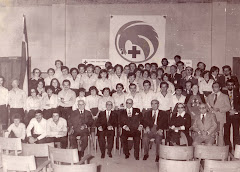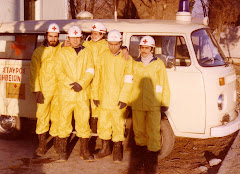Τρίτη 8 Δεκεμβρίου 2009
Η ΑΝΑΚΟΙΝΩΣΗ ΤΟΥ ΠΑΓΚΟΣΜΙΟΥ ΟΡΓΑΝΙΣΜΟΥ ΥΓΕΙΑΣ ΣΤΑ ΑΓΓΛΙΚΑ
printable version
WHO use of advisory bodies in responding to the influenza pandemic
Pandemic (H1N1) 2009 briefing note 19
3 DECEMBER 2009 | GENEVA -- WHO is aware of some concerns, expressed in the media, that ties with the pharmaceutical industry among experts on the Organization’s advisory bodies may influence policy decisions, especially those relating to the influenza pandemic.
WHO has historically collaborated with the pharmaceutical industry for legitimate reasons. Efforts to improve health depend on better access to high-quality and affordable medicines, vaccines, and diagnostics. Medical interventions, including antiviral drugs, vaccines, and diagnostic tests, have long been recognized for their role in mitigating the health impact of an influenza pandemic. Pharmaceutical companies play an essential role in this regard and WHO has engaged with them to pursue its public health objectives.
Conflicts of interest: safeguards in place
Potential conflicts of interest are inherent in any relationship between a normative and health development agency, like WHO, and a profit-driven industry. Similar considerations apply when experts advising the Organization have professional links with pharmaceutical companies. Numerous safeguards are in place to manage possible conflicts of interest or their perception.
External experts who advise WHO are required to provide a declaration of interests that details professional or financial interests that could compromise the impartiality of their advice. Procedures are in place for identifying, investigating and assessing potential conflicts of interest, disclosing them, and taking appropriate action such as excluding an expert from participating in a meeting.
International Health Regulations
The influenza pandemic is providing the first major test of the revised International Health Regulations, which were approved by WHO Member States in 2005 and came into legal force in 2007. The Regulations provide an orderly, rules-based mechanism for coordinating the response to public health emergencies of international concern, such as that caused by the H1N1 pandemic virus.
Apart from protecting public health against the international spread of disease, the Regulations contain provisions for avoiding unnecessary interference with international travel and trade.
Under the provisions of the revised Regulations, an Emergency Committee advises the WHO Director-General on matters such as declaring a public health emergency of international concern, the need to raise the level of pandemic alert following spread of the H1N1 virus, and the need to introduce temporary measures, such as restrictions on travel or trade. Final decisions are made by the Director-General, as guided by the Committee’s advice.
All members of the Emergency Committee sign a confidentiality agreement, provide a declaration of interests, and agree to give their consultative time freely, without compensation. Members of the Committee are drawn from a roster of about 160 experts covering a range of public health areas. The framework for membership is set out in the International Health Regulations. Each State Party to the Regulations is entitled to nominate one member of the roster and additional experts are appointed by the Director-General. Recommendations of the Emergency Committee are immediately made public on the WHO web site together with the relevant decisions of the Director-General.
Strategic Advisory Group of Experts on Immunization
In responding to the pandemic, WHO has also drawn on advice from a standing body of experts, the Strategic Advisory Group of Experts on Immunization (SAGE), which advises WHO on vaccine use. Members of SAGE are likewise required to declare all professional and financial interests, including funding received from pharmaceutical companies or consultancies or other forms of professional engagement with pharmaceutical companies. The names and affiliations of members of SAGE and of SAGE working groups are published on the WHO web site, together with meeting reports and declarations of interest submitted by the experts.
Allegations of undeclared conflicts of interest are taken very seriously by WHO, and are immediately investigated.
Criticisms: understandable but unfounded
Public perceptions about the current H1N1 influenza pandemic, as well as national preparedness plans, were strongly influenced by a five-year close watch over the highly lethal H5N1 avian influenza virus, which was widely regarded as the virus most likely to ignite the next influenza pandemic. A pandemic caused by a virus that kills more than 60% of the people it infects is strikingly, and fortunately, very different from the reality of the current pandemic.
Adjusting public perceptions to suit a far less lethal virus has been problematic. Given the discrepancy between what was expected and what has happened, a search for ulterior motives on the part of WHO and its scientific advisers is understandable, though without justification.
WHO has consistently assessed the impact of the current influenza pandemic as moderate. WHO has consistently reminded the medical community, public, and media that the overwhelming majority of patients experience mild influenza-like illness and recover fully within a week, even without any form of medical treatment. WHO has consistently advised against any restrictions on travel or trade. Although influenza viruses are notoriously unpredictable, it is hoped that this moderate impact will continue throughout the duration of the pandemic.
"Μέτρια" η γρίππη λέει τώρα ο Π.Ο.Υ. ! Πάρα πολύ σημαντική ανακοίνωση !
Σε μια άνευ προηγουμένου ανακοίνωσή του, ο Παγκόσμιος Οργανισμός Υγείας, απολογείται, για τον υπερβολικό θόρυβο γύρω από τη γρίππη.
Συγκεκριμένα λέει τα άκρως σημαντικά και μάλλον καθησυχαστικά:
Ο Π.Ο.Υ. έχει αξιολογήσει συστηματικά τις επιπτώσεις της τρέχουσας πανδημία γρίπης ως μέτρια. Ο Π.Ο.Υ. υπενθύμισε με συνέπεια στην ιατρική κοινότητα, δημόσια, και μέσω των μέσων ενημέρωσης, ότι η εμπειρία από τη συντριπτική πλειοψηφία των ασθενών δείχνει ότι περνούν ήπια γριππώδη συνδρομή και ανακτούν πλήρως μέσα σε μια εβδομάδα, έστω και αν δεν λάβουν καμιά μορφή ιατρικής περίθαλψης. Ο Π.Ο.Υ. πάγια συνιστά την αποφυγή τυχόν περιορισμών σε ταξίδια ή το εμπόριο. Αν και η εξέλιξη των ιών της γρίπης είναι εμφανώς απρόβλεπτη, εκφράζεται η ελπίδα ότι αυτή η μέτρια επίδραση θα συνεχιστεί καθ όλη τη διάρκεια της πανδημίας.
Στα Αγγλικά:
WHO has consistently assessed the impact of the current influenza pandemic as moderate. WHO has consistently reminded the medical community, public, and media that the overwhelming majority of patients experience mild influenza-like illness and recover fully within a week, even without any form of medical treatment. WHO has consistently advised against any restrictions on travel or trade. Although influenza viruses are notoriously unpredictable, it is hoped that this moderate impact will continue throughout the duration of the pandemic.
Επίσης, ο Παγκόσμιος Οργανισμός Υγείας, απολογείται για τους δεσμούς γιατρών και φαρμακευτικής βιομηχανίας (!!!)
Είναι η ανακοίνωση ν.19 και μπορείτε να τη δείτε ολόκληρη, στο πρωτοτυπο,παραπάνω.
Αναρτήθηκε από taxalia στις 11:26:00 μμ
Εγγραφή σε:
Σχόλια (Atom)






